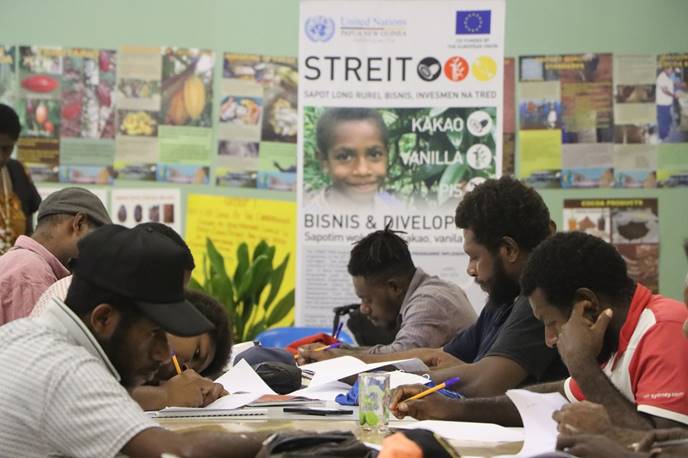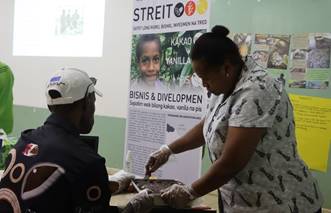The EU-STREIT Programme in Papua New Guinea rolled out a capacity-building training for cocoa quality control and assessors’ experts, enabling them to contribute to securing a competitive advantage for this product in foreign markets.
The training aims to address outstanding cocoa quality production challenges in Papua New Guinea. The FAO-led EU-STREIT PNG Programme, partnered with the Cocoa Board, commenced rolling out of the first comprehensive eight-module Cocoa Assessors Training Program in the Sepik Region.
The first part of the training program, which was held in the third week of July in Wewak in East Sepik Province, saw 49 participants, including 10 women from various sections of the cocoa value chain, taking part. Participants comprise extension officers from the Division of Agriculture and Livestock, Cocoa Board, and cocoa assessors representing dry bean exporters active in the area. Some model farmers/fermentary owners also attended the weeklong session conducted by three female facilitators from the quality section of the Cocoa Board Head Office in Kokopo, East New Britain Province.

The primary purpose of this training program is to address quality control issues by exporting companies and small fermentary owners.
“They must have this knowledge to ferment, dry, and produce quality cocoa, likewise for cocoa assessors in exporting operations, to know cocoa quality aspects to assess cocoa supplied by village farmers. Because our comparative edge in the world market is quality, and we must be able to control that,” said Daryl Worimo, the Sepik Cocoa Board Regional Manager.
Cocoa is an important source of income for about 500,000 people of the East Sepik and the Sandaun Provinces where the program is being implemented.
For many of the participants, it was their first to learn about cocoa inspection regulations, requirements for registration of cocoa fermentaries, and proper cocoa drying and fermentation processes. Participants were also introduced to the Cocoa Act 1981, quality management systems, how different agencies are involved in the cocoa industry, hooking and breaking the cocoa pods, cocoa processing, and PNG export standards.
Group discussions with field visits to model cocoa blocks and fermentary set-ups and exporters’ processing facilities were part of the weeklong training. Participants also learned how to produce chocolate from cocoa beans in their homes.
“I believe that with these tailor-made training and the improved technical and management skills of the key players of the value chain, coca production capacity (quality and quantity) and financial return of cocoa farmers in PNG will be dramatically improved, and more and more farmers will benefit from the cocoa sector and improve their livelihoods in a more sustainable way”, said Dr. Xuebing Sun, EU STREIRT Programme Coordinator.
Appreciating the contribution of EU-STREIT PNG to the development of the region, the East Sepik Governor, Allan Bird, in his remarks at this training, explained the importance of the EU-STREIT PNG Programme which is to generate cash flow for the rural economy through cash crops like cocoa and vanilla.
“When we empower our people, the country will move. That’s the power of things like cocoa. This is why I’m happy for the European Union with FAO and Cocoa Board to join because no single person can do it alone. We have to join hands to make big things happen, and I’m happy to see women participants here as well,” said Bird.
The EU-STREIT PNG’s Programme Coordinator, Dr. Xuebing Sun, also in his remarks underscored the fact that the Programme is here to join hands with local partners and other implementing agencies like exporters to drive the cocoa value chain in the Sepik Region.
“the EU STREIT PNG is an evidence-based, country-led, and country-owned program. I highly appreciate the great importance attached to the Program by both the provincial governors and Provincial Administrations in Sepik.
EU STREIT PNG and the government agencies will work more closely to further the alignments between EU STREIT PNG and the government priorities.” He added.
The EU-STREIT PNG, being implemented as a United Nations joint Programme (FAO as leading agency, and ILO, ITU, UNCDF, and UNDP as implementing partners), is the largest grant-funded Programme of the European Union in the country and the Pacific region, which focuses on increasing sustainable and inclusive economic development of rural areas through Increasing the economic returns and opportunities from cocoa, vanilla and fishery value chains and strengthening and improving the efficiency of value chain enablers including the business environment and supporting sustainable, climate-proof transport and energy infrastructure development.


